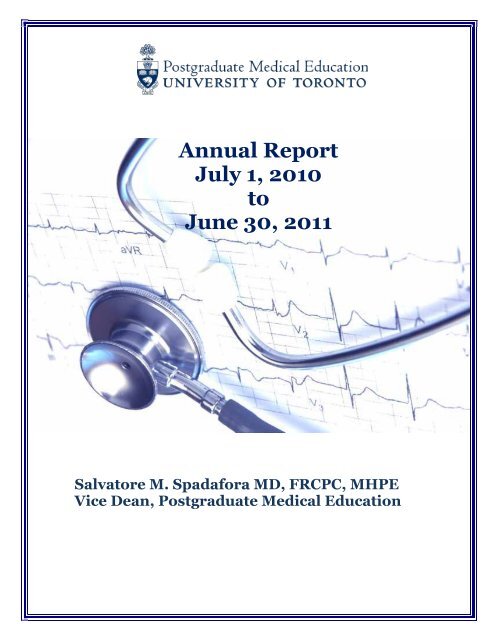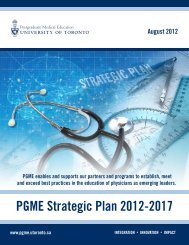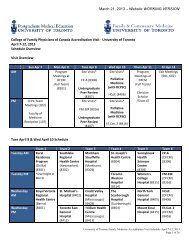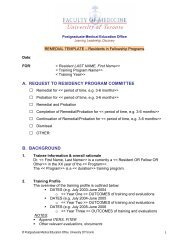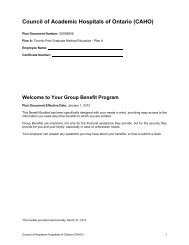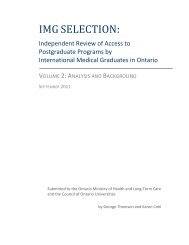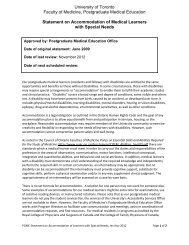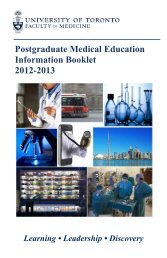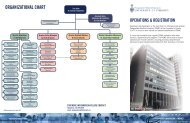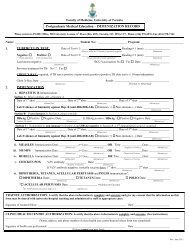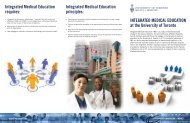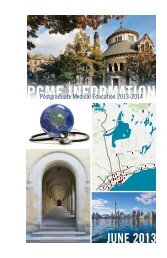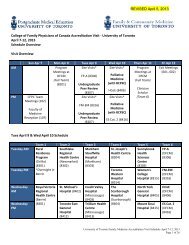PGME Annual Report 2011 - Post Graduate Medical Education ...
PGME Annual Report 2011 - Post Graduate Medical Education ...
PGME Annual Report 2011 - Post Graduate Medical Education ...
You also want an ePaper? Increase the reach of your titles
YUMPU automatically turns print PDFs into web optimized ePapers that Google loves.
<strong>Annual</strong> <strong>Report</strong><br />
July 1, 2010<br />
to<br />
June 30, <strong>2011</strong><br />
Salvatore M. Spadafora MD, FRCPC, MHPE<br />
Vice Dean, <strong>Post</strong>graduate <strong>Medical</strong> <strong>Education</strong>
<strong>Annual</strong> <strong>Report</strong> - <strong>Post</strong>graduate <strong>Medical</strong> <strong>Education</strong> 2010-11<br />
TABLE OF CONTENTS<br />
1. Introduction<br />
2. Overview of <strong>PGME</strong> Units<br />
a. <strong>PGME</strong> Organizational Chart<br />
b. Vice Dean Committees<br />
3. Enrolment/Expansion/Admissions<br />
a. Growth (2006 to <strong>2011</strong>)<br />
b. Quota Allocations<br />
c. CaRMS Performance<br />
d. MTDs and key hospital affiliates<br />
e. Contribution to Physician Supply<br />
f. Visa Trainee <strong>Report</strong><br />
g. Integrated <strong>Medical</strong> <strong>Education</strong><br />
h. FEAC and Fellowship Survey<br />
4. Research and <strong>Education</strong><br />
a. PGCorEd, CIPCorEd and Portal<br />
b. Future of <strong>Medical</strong> <strong>Education</strong> in Canada (FMEC-PG)<br />
c. Internal Reviews/Accreditation – IRC<br />
d. Board of Examiners<br />
e. Highlights from workshops and faculty and program development<br />
5. Resident Wellness<br />
a. Mandate<br />
b. Residents Seeking Support<br />
c. Database Development<br />
d. Staffing Developments<br />
e. <strong>Education</strong>al Activities<br />
f. Toronto Model of Integrated <strong>Medical</strong> <strong>Education</strong> (T-IME)<br />
g. Contributions to national and international physician health initiatives<br />
h. Health Force Ontario Practice Ontario Partnership<br />
i. Board of <strong>Medical</strong> Assessors (<strong>PGME</strong>)<br />
6. Assessment and Evaluation<br />
a. POWER<br />
b. Resident Exit Survey<br />
Appendix A - New and Exiting Program Directors and Committee Members<br />
Appendix B - Scholarly Activities<br />
Appendix C - <strong>Post</strong>graduate <strong>Medical</strong> <strong>Education</strong> Awards<br />
<strong>PGME</strong> 2010-11 <strong>Annual</strong> <strong>Report</strong><br />
1
<strong>Annual</strong> <strong>Report</strong> - <strong>Post</strong>graduate <strong>Medical</strong> <strong>Education</strong> 2010-11<br />
Dr. Salvatore Spadafora, Vice Dean, <strong>Post</strong>graduate <strong>Medical</strong> <strong>Education</strong><br />
1. Introduction<br />
2010-11 was a year characterized with continued<br />
expansion, ongoing transformation and the beginnings of<br />
some new directions at <strong>PGME</strong> at the University of Toronto.<br />
We saw continued expansion in the numbers of both our<br />
postgraduate trainees as well as staff in the <strong>PGME</strong> office.<br />
The U of T <strong>PGME</strong> enterprise was one of three university<br />
partners (along with McGill and UBC) in undertaking<br />
the challenge of the Future of <strong>Medical</strong> <strong>Education</strong><br />
in Canada for postgraduate medical education<br />
and has been involved in all facets of the<br />
Faculty of Medicine’s Integrated <strong>Medical</strong> <strong>Education</strong> (IME)<br />
initiative.<br />
After many months of negotiations with government,<br />
all of the Ontario medical schools were successful in obtaining<br />
specialty expasion positions, along with new levels<br />
of funding to support 75 new entry positions in RCPSC<br />
specialties. U of T received 26 of these new positions to be<br />
implemented over five years beginning in <strong>2011</strong>-12. Part<br />
of this new funding was to support equipment and infrastructure<br />
with an investment of almost $1M in<br />
videoconference technology and other resources for U of T<br />
teaching sites and programs in 2010-11. This expansion is<br />
taking place alongside the final phases of the second Family<br />
Medicine Expansion which will add 49 more entry positions<br />
from 2008-09 to 2012-13.<br />
The <strong>PGME</strong> Office has also benefited from important new<br />
additions. A Search Committee struck in January <strong>2011</strong><br />
selected Dr. Glen Bandiera as our new Associate Dean,<br />
<strong>PGME</strong>, Admissions and Evaluation, effective July 1, <strong>2011</strong>.<br />
Dr. Bandiera is an experienced clinician-educator and<br />
brings significant expertise to the oversight of CARMS,<br />
the POWER system, <strong>PGME</strong>’s strategic plan, internal<br />
reviews, and accreditation.<br />
We are also very fortunate to be able to expand our support<br />
services for POWER as well as our capacity for <strong>PGME</strong><br />
research. Ms. Khushnoor Adatia joined <strong>PGME</strong> as a User<br />
Support Services Officer, Ms. Melissa Kennedy Hynes as<br />
a Research Coordinator and Ms. Tamara Bahr as Manag-<br />
er, Instructional Design. Mr.<br />
Christopher Hurst has become<br />
a full-time Wellness Consultant<br />
with the Office of Resident<br />
Wellness.<br />
<strong>PGME</strong> staff have played an integral<br />
role in the start-up of the<br />
Toronto Integrated <strong>Medical</strong> <strong>Education</strong><br />
(T-IME) program and<br />
working groups through the<br />
T-IME project since its launch<br />
in December 2010. This new initiative comes on the heels<br />
of a very successful planning project with the Mississauga<br />
Academy of Medicine and its partner hospitals<br />
which resulted in an approved budget, a<br />
12-year planned <strong>PGME</strong> roll-out and continued involvement<br />
in capital planning and operations to<br />
support residency education.<br />
The Office of <strong>PGME</strong> has been instrumental in supporting<br />
new T-IME initiatives such as payments for community<br />
preceptors, integration of both <strong>PGME</strong> and UGME<br />
registration and evaluation systems (POWER and<br />
MedSIS), aligning policies and procedures,<br />
supporting learners and creating a streamlined system for<br />
faculty appointments.<br />
Our office continues to develop online curriculum and<br />
core competency teaching through web-based e-learning<br />
PGCorEd modules. The launch of CIP CorEd in Fall <strong>2011</strong><br />
will further the department’s exceptional online resources.<br />
<strong>PGME</strong> staff maintain a high rate of involvement in<br />
medical education and wellness research projects<br />
and presentations. This fact is evidenced in<br />
Appendix B, which lists their 2010-11 participation /<br />
authorship in 18 papers, 16 posters, 9 workshops,<br />
9 publications, as well as the FMEC-PG grant<br />
from AFMC.<br />
We continue to forge relationships with our long-standing<br />
community hospitals and develop new relationships<br />
2 <strong>PGME</strong> 2010-11 <strong>Annual</strong> <strong>Report</strong>
<strong>Annual</strong> <strong>Report</strong> - <strong>Post</strong>graduate <strong>Medical</strong> <strong>Education</strong> 2010-11<br />
with partners such as Credit Valley Hospital and Trillium<br />
Health Centre. We look to all of our community affiliates to<br />
assist with the next wave of expansion, but understand the<br />
challenges of transportation, physical infrastructure and<br />
human resources.<br />
I would like to thank all of the staff on the <strong>PGME</strong><br />
team for their contributions to this impressive year of<br />
innovation and growth, as well as those individuals who<br />
contributed to this report. The <strong>PGME</strong> medical enterprise at<br />
U of T maintains its status as an unparalleled learning and<br />
teaching environment, and it is the expertise of the <strong>PGME</strong><br />
staff, program directors, residents and academics that<br />
make this possible.<br />
Respectfully submitted,<br />
Salvatore M. Spadafora MD, FRCPC, MHPE<br />
Vice Dean, <strong>Post</strong>graduate <strong>Medical</strong> <strong>Education</strong><br />
University of Toronto<br />
<strong>PGME</strong> 2010-11 <strong>Annual</strong> <strong>Report</strong><br />
3
<strong>Annual</strong> <strong>Report</strong> - <strong>Post</strong>graduate <strong>Medical</strong> <strong>Education</strong> 2010-11<br />
2. Overview of <strong>PGME</strong> Units<br />
a) <strong>PGME</strong> Organizational Chart<br />
4 <strong>PGME</strong> 2010-11 <strong>Annual</strong> <strong>Report</strong>
<strong>Annual</strong> <strong>Report</strong> - <strong>Post</strong>graduate <strong>Medical</strong> <strong>Education</strong> 2010-11<br />
b) Vice Dean Committees<br />
The Vice Dean sits on a number of committees, Faculty, provincial, and national:<br />
<strong>PGME</strong>/Faculty<br />
• <strong>Post</strong>graduate <strong>Medical</strong> <strong>Education</strong> Advisory Committee<br />
(<strong>PGME</strong>AC)<br />
• Hospital University <strong>Education</strong> Committee (HUEC)<br />
• Internal Review Committee (IRC)<br />
• Board of Examiners – PG<br />
• POWER Steering Committee<br />
• Fellowship <strong>Education</strong> Advisory Committee (FEAC)<br />
• Dean’s Executive Committee<br />
• <strong>Education</strong> Deans Committee<br />
• Academic Partnership Steering Committee (APSC)<br />
• Clinical Teachers Association of Mississauga (CTAM)<br />
• UGME Curriculum Committee<br />
• Wilson Centre Management Committee<br />
• SIMOne<br />
Provincial/National<br />
• PGM: Council of Ontario Faculties of Medicine<br />
• PGE: Council of Ontario Faculties of Medicine<br />
• RCPSC Accreditation Committee<br />
• CFPC Accreditation Committee<br />
• Triple C Curriculum Committee (CFPC)<br />
• Sustainability Committee (Restricted Registration)<br />
3. Enrolment/Expansion/Admissions<br />
a) Growth (2006 to <strong>2011</strong>)<br />
As noted in Figure 1 below, <strong>PGME</strong> had 1,876 residents<br />
and 1,124 clinical fellows registered in 74 programs across<br />
17 Departments/Units in the 2010-11 academic session.<br />
These trainees rotated through our 30 affiliated<br />
hospitals, and innumerable clinical training sites such as<br />
doctor’s offices, community health centres and clinics. The<br />
departments with the largest number of trainees (residents<br />
and fellows) are Medicine, Surgery, Pediatrics, and<br />
Family Medicine.<br />
Using 2006-07 as our base, Figure 2 shows an overall<br />
growth of 18.6% in clinical fellow enrolment, and a 28%<br />
growth in resident enrolment over that 4 year period.<br />
As Figure 3 shows below, further growth is forecast for<br />
<strong>PGME</strong> with 10 additional Family Medicine positions in<br />
2012-13, and specialty programs expanding by 10 to 12<br />
positions over the next two years. As noted previously,<br />
expansion in specialty areas is part of a new agreement<br />
between Ontario medical schools and the Ministry<br />
of Health and Long-Term Care, committing to the<br />
addition of 75 specialty intake positions over five years.<br />
<strong>PGME</strong> 2010-11 <strong>Annual</strong> <strong>Report</strong><br />
5
<strong>Annual</strong> <strong>Report</strong> - <strong>Post</strong>graduate <strong>Medical</strong> <strong>Education</strong> 2010-11<br />
Figure 1<br />
UofT <strong>PGME</strong> Enrolment, 2010-11<br />
Fellows and PGYs, by department<br />
6 <strong>PGME</strong> 2010-11 <strong>Annual</strong> <strong>Report</strong>
<strong>Annual</strong> <strong>Report</strong> - <strong>Post</strong>graduate <strong>Medical</strong> <strong>Education</strong> 2010-11<br />
Figure 2<br />
Figure 3<br />
<strong>PGME</strong> 2010-11 <strong>Annual</strong> <strong>Report</strong><br />
7
<strong>Annual</strong> <strong>Report</strong> - <strong>Post</strong>graduate <strong>Medical</strong> <strong>Education</strong> 2010-11<br />
“<br />
The University of Toronto has the<br />
best track record in the country in the<br />
annual national PGY1 CaRMS match.<br />
b) Quota Allocations<br />
”<br />
The Quotas Allocation Subcommittee of the <strong>Post</strong>graduate<br />
<strong>Medical</strong> <strong>Education</strong> Advisory Committee (<strong>PGME</strong>AC) was<br />
established in 2006 to develop a systematic method with fair<br />
and objective criteria for planning our physician intake and<br />
subsequent output. The Committee’s Terms of Reference outline<br />
a transparent and competitive process for the allocation of<br />
residency positions taking into account: a program’s<br />
past and current quotas; teaching faculty/preceptor<br />
capacity and availability; infrastructure and administrative<br />
support; previous CaRMS application numbers and match<br />
performance; accreditation status; and, societal need on a<br />
provincial, national, and global level.<br />
c) CaRMS Performance<br />
Admission to most residency programs at U of T<br />
<strong>PGME</strong> occurs through the national Canadian Resident<br />
Matching Service (CaRMS). CaRMS currently runs<br />
matches for the following areas: PGY1 Entry programs<br />
in March; <strong>Medical</strong> Subspecialty programs in November;<br />
CCFP-EM positions in December; and, Pediatric<br />
Subspecialty positions in June.<br />
The largest match is the PGY1 match in March. The<br />
University of Toronto has the best track record in the<br />
country with zero to very few vacant positions after the first<br />
iteration. As indicated in Figure 4, no other medical school<br />
in Canada has had this kind of success despite increasing<br />
quotas each year since 2005.<br />
Figure 4<br />
CaRMS Match Performance 2006-<strong>2011</strong><br />
Vacancies after First Iteration - CMGs and IMGs<br />
The Quotas Allocation Subcommittee meets 1 to 2 times<br />
over the Summer and Fall to consider requests for changes<br />
in PGY1 quotas. The subcommittee also considers quotas<br />
for subspecialty positions in Medicine and Pediatrics, and<br />
the enhanced skills program in family medicine.<br />
The MOHLTC in partnership with the Ontario <strong>Medical</strong><br />
Association hired the Conference Board of<br />
Canada to develop a needs-based simulation model to<br />
project future supply of and need for physicians in Ontario.<br />
It compares the supply of physician services to<br />
the population’s need for health services to quantify a<br />
gap in services and translate the gap into a physician<br />
requirement. As part of PGM:COFM, UofT <strong>PGME</strong> (via<br />
the Quotas Allocation Subcommittee) will work with the<br />
government to focus development on those specialties required<br />
to meet societal demand.<br />
8 <strong>PGME</strong> 2010-11 <strong>Annual</strong> <strong>Report</strong>
<strong>Annual</strong> <strong>Report</strong> - <strong>Post</strong>graduate <strong>Medical</strong> <strong>Education</strong> 2010-11<br />
Figure 5 below presents Canadian <strong>Medical</strong> <strong>Graduate</strong>s<br />
by school of medical degree, and shows that the % of<br />
medical students drawn from UofT in the match has remained<br />
steady over the last few years.<br />
In the CARMS <strong>2011</strong> match to U of T <strong>PGME</strong>, 39% were from<br />
UofT UGME, 40% from other Ontario medical schools, 18%<br />
from other Canadian medical schools, and 3% from the U.S.<br />
Figure 5 Source of MD: CMGs<br />
d) <strong>Medical</strong> Trainee Days and Hospital Affiliates<br />
As of <strong>2011</strong>, the Faculty of Medicine had 30 affiliated<br />
teaching sites. Figure 6 lists our teaching facilities<br />
within the full, community and special care community<br />
affiliate categories.<br />
Figure 6<br />
<strong>PGME</strong> 2010-11 <strong>Annual</strong> <strong>Report</strong><br />
9
<strong>Annual</strong> <strong>Report</strong> - <strong>Post</strong>graduate <strong>Medical</strong> <strong>Education</strong> 2010-11<br />
<strong>Medical</strong> Trainee Days (MTDs) are becoming an increasingly<br />
important measure of teaching activity in both our<br />
full and community affiliated hospitals. The data is tracked<br />
by individual hospitals according to standards set by the<br />
MOHLTC. The information is then used by the Ministry<br />
in the overall hospital funding formula and, more recently,<br />
it has also been used to determine funding for overhead<br />
and additional expenses related to teaching in<br />
community affiliates.<br />
“<br />
<strong>PGME</strong> at the University of Toronto is<br />
the leading contributor of new graduate<br />
physicians entering practice in Canada<br />
and Ontario each year.<br />
”<br />
MTDs are tracked for medical students, residents and<br />
fellows according to their level of training, the medical<br />
school of registration, hospital, training program, and<br />
rotation service.<br />
There are over 1 million teaching days at U of T’s full and<br />
community affiliates, including over 865,000 trainee days<br />
for residents and fellows. Figure 7 below shows that trainee<br />
days for UofT PG residents and fellows represent over 30%<br />
of all PG trainee days in Ontario hospitals. In 2009-10,<br />
the majority of those PG trainee days occurred at the University<br />
Health Network (289,346), St. Michael’s Hospital<br />
(171,000), Sunnybrook (166,000), Sick Kids (155,000), and<br />
Mt. Sinai (152,000). Figure 8 reveals that an increasing<br />
number of training days are also occurring in community<br />
affiliate hospitals.<br />
Figure 7<br />
10 <strong>PGME</strong> 2010-11 <strong>Annual</strong> <strong>Report</strong>
<strong>Annual</strong> <strong>Report</strong> - <strong>Post</strong>graduate <strong>Medical</strong> <strong>Education</strong> 2010-11<br />
Figure 8<br />
e) Contribution to Physician Supply<br />
<strong>PGME</strong> at the University of Toronto continues to provide the<br />
majority of new graduate physicians entering the Canadian<br />
and Ontario practice pool each year. In 2010, it is estimated<br />
that the practice entry cohort exiting our programs was 427<br />
(19%) of the total practice entry cohort from all Canadian<br />
medical schools. The next highest contributors are UBC at<br />
11% and the University of Montreal at 9% (CAPER <strong>2011</strong>).<br />
As of 2010 in Ontario, graduates from the <strong>PGME</strong> programs<br />
at the University of Toronto represented 56% of active<br />
specialists and 37% of active Family Physicians (Figures 9<br />
and 10).<br />
<strong>PGME</strong> 2010-11 <strong>Annual</strong> <strong>Report</strong><br />
11
<strong>Annual</strong> <strong>Report</strong> - <strong>Post</strong>graduate <strong>Medical</strong> <strong>Education</strong> 2010-11<br />
Figure 9 and 10<br />
Figure 9: U of T’s contribution to Specialist<br />
Physicians in Ontario, OPHRDC <strong>2011</strong><br />
Figure 10: U of T’s contribution to Family<br />
Medicine in Ontario, OPHRDC <strong>2011</strong><br />
With 70 RCPSC accredited specialty programs, the<br />
University of Toronto has also made a significant contribution<br />
to the supply of selected specialties in the province,<br />
with many of the areas having been deemed high priority<br />
by the MOHLTC based on population needs. For example,<br />
as of 2010, approximately 85% of active Ontario-trained<br />
dermatologists, 83% of active Ontario-trained Community<br />
Medicine specialists, and 72% of active Ontario-trained neurosurgeons<br />
were graduates of the U of T residency programs.<br />
Figure 11 illustrates the percentage of active Ontariotrained<br />
specialists who did their training at the University<br />
of Toronto as of 2010.<br />
12 <strong>PGME</strong> 2010-11 <strong>Annual</strong> <strong>Report</strong>
<strong>Annual</strong> <strong>Report</strong> - <strong>Post</strong>graduate <strong>Medical</strong> <strong>Education</strong> 2010-11<br />
f) Visa Trainee <strong>Report</strong><br />
Registration<br />
The <strong>PGME</strong> Office supports the University of Toronto’s<br />
postgraduate medical programs in their commitment to<br />
training international learners (“visa trainees”). A total<br />
of 878 visa trainees registered with the <strong>PGME</strong> Office as<br />
research fellows, clinical fellows or residency trainees in<br />
2010-11. These trainees originated from over 60 different<br />
countries. Ten countries – Saudi Arabia, U.K., India,<br />
Israel, Australia, Japan, Brazil, Ireland, U.S.A. and Kuwait –<br />
accounted for more than half of all visa trainees enrolled<br />
in 2010-11.<br />
Sponsored Visa Trainees<br />
Sponsorship funding supported 197 of the 878 visa trainees.<br />
The Saudi Arabian Cultural Bureau funded two-thirds<br />
of all sponsored trainees (133 of 197 trainees).<br />
The total intake of new sponsored trainees for 2010-<br />
11 was 71 (18 new residents and 53 new fellows). This<br />
number represents a drop of 9% from 2009-10, when 78 new<br />
sponsored trainees were registered, but still exceeds<br />
the intake of any other year since 2001. The<br />
new sponsored trainees for 2010-11 each paid the<br />
tuition rate of $65,000 per annum. Fellowship<br />
appointments, which are normally no more than two years<br />
in duration, made up almost three-quarters of the new<br />
intake (53 of 71 new trainees)<br />
The Saudi Bureau accounted for 85.9% of the new sponsored<br />
trainee intake for 2010-11 (61 of 71 new sponsored<br />
trainees, including 11 new residents and 50 new fellows).<br />
Application and Acceptance of Sponsored Trainees for<br />
<strong>2011</strong>-12<br />
To date, Saudi Bureau sponsored applicants have accounted<br />
for 75.5% of all residency applications (308 out of 408)<br />
and 84.7% of all fellowship applications (249 out of 294) for<br />
<strong>2011</strong>-12.<br />
The number of sponsored applicants accepted for <strong>2011</strong>-12<br />
currently stands at 80, a record intake of new sponsored<br />
trainees. These trainees will each pay the new tuition rate<br />
Figure 12 records trainee registration by citizenship (2004 to <strong>2011</strong>)<br />
Canadian Citizens / Permanent Residents vs. Visa Trainees<br />
<strong>PGME</strong> 2010-11 <strong>Annual</strong> <strong>Report</strong><br />
13
<strong>Annual</strong> <strong>Report</strong> - <strong>Post</strong>graduate <strong>Medical</strong> <strong>Education</strong> 2010-11<br />
of $75,000 per annum, a 15% increase over the 2010-11 rate<br />
of $65,000 per annum.<br />
Visa Trainees as a Proportion of Total <strong>PGME</strong> Enrolment:<br />
Excluding electives, visa trainees in 2010-11 represented<br />
27.3% of the total <strong>PGME</strong> enrolment (878 of 3212 trainees).<br />
Internationally sponsored residency trainees made up<br />
4.0% of the total enrolment of residency trainees (80 of<br />
2003 residents).<br />
Enrolment of Canadian citizens and permanent residents<br />
in residency training programs has increased while the enrolment<br />
of sponsored residents has declined. In addition,<br />
enrolment of sponsored trainees has shifted from residency<br />
to fellowship training.<br />
g) Integrated <strong>Medical</strong> <strong>Education</strong><br />
Review of DME/IME in Toronto<br />
In August 2009, Drs. Joanna Bates from UBC and Carol<br />
Herbert from UWO conducted an external review of distributed<br />
medical education (DME) for the Faculty of Medicine<br />
at the University of Toronto. The report was circulated<br />
to Clinical Chairs, members of HUEC, and Program<br />
Directors in October 2009. The report made a number<br />
of recommendations related to vision, structure and coordination,<br />
funding, process of affiliation and research, as<br />
well as specific recommendations related to the expansion<br />
of learners in Mississauga.<br />
On June 9, 2010, the Dean hosted a workshop of Clinical<br />
Chairs to confirm principles and priorities for Integrated<br />
<strong>Medical</strong> <strong>Education</strong> (IME). The workshop was important as<br />
it outlined the way forward with multiple IME initiatives.<br />
Three summits with CEOs and Vice Presidents of <strong>Medical</strong><br />
<strong>Education</strong>/<strong>Medical</strong> Affairs from U of T’s community hospital<br />
affiliates were held in late 2010 and early <strong>2011</strong> to formalize<br />
the “value proposition” of a dedicated IME program.<br />
These summits addressed preceptor funding programs,<br />
faculty appointment processing and faculty development.<br />
Toronto Model of Integrated <strong>Medical</strong> <strong>Education</strong><br />
(T-IME) Project<br />
In December 2010, the T-IME (Toronto model of Integrated<br />
<strong>Medical</strong> <strong>Education</strong>) project was formally established.<br />
Chaired by the Deputy Dean as the Dean’s representative,<br />
the T-IME Steering Committee commenced operations in<br />
January <strong>2011</strong>. T-IME initially focused on the full affiliates<br />
and the five primary community affiliates (Credit Valley<br />
Hospital, Trillium Health Centre, Toronto East General<br />
Hospital, North York General Hospital and St. Joseph’s<br />
Health Centre), with a graduated phase-in of the remaining<br />
community affiliates.<br />
The primary goals of the T-IME project are two-fold:<br />
• Establish and implement a sustainable framework for<br />
integrated medical education (IME);<br />
• Develop and implement an accountability framework to<br />
support integrated medical education that flows with the<br />
learner and teacher, and is across programs rather than<br />
across sites.<br />
Eight working groups met on a regular basis and started<br />
on a range of short and long-term deliverables in the areas<br />
of Finance; Key Performance Indicators; the Learner<br />
Experience; Policies and Procedures (educational environment);<br />
CEPD and FD; Faculty Appointments and Promotions;<br />
Power/MedSIS; and, IT Connectivity. Membership<br />
included <strong>PGME</strong> staff, Vice Deans, as well as senior-level<br />
representatives from the University, full and community<br />
affiliated hospitals.<br />
T-IME accomplishments to date, related to <strong>PGME</strong>, include:<br />
• Signing of a Transfer Payment Agreement (TPA) with the<br />
Ministry of Health in March <strong>2011</strong> to fund IME activities,<br />
in particular, preceptor funding. A total of $1,000 per<br />
learner block was made available for eligible teaching,<br />
retroactive to January <strong>2011</strong>. The funding was identified<br />
as “following” the learner, rather than the faculty member<br />
or clinical department.<br />
• Formal agreements with 12 community hospital affiliates<br />
and an additional 7 community agencies. The agreements<br />
address issues related to education in the community and<br />
preceptor payment.<br />
• Over 500 new, part-time faculty appointments since January<br />
1, <strong>2011</strong> in community affiliated hospitals.<br />
14 <strong>PGME</strong> 2010-11 <strong>Annual</strong> <strong>Report</strong>
<strong>Annual</strong> <strong>Report</strong> - <strong>Post</strong>graduate <strong>Medical</strong> <strong>Education</strong> 2010-11<br />
The T-IME Project has also allowed the Faculty of Medicine to:<br />
“<br />
• Provide a focus for attention to the accreditation<br />
standards (in both UGME and <strong>PGME</strong>), particularly<br />
through the Policies and Procedures and the Learner<br />
Experience Working Groups.<br />
• Create an opportunity to review and update the<br />
affiliation agreements in order to incorporate the<br />
adoption of integrated medical education strategies<br />
at affiliate hospitals.<br />
•Develop a mechanism for bringing strategies around<br />
integrated medical education into the Faculty of<br />
Medicine’s strategic planning process.<br />
• Provided a forum, through the Steering Committee,<br />
for networking and building working relationships<br />
between the Faculty of Medicine and its medical<br />
education stakeholders.<br />
The Office of Integrated <strong>Medical</strong><br />
<strong>Education</strong> (OIME) works closely with<br />
staff from <strong>PGME</strong> to implement<br />
preceptor payment systems as well as<br />
other strategic initiatives, and to<br />
provide support to working groups.<br />
”<br />
The Office of Integrated <strong>Medical</strong> <strong>Education</strong> (OIME)<br />
The Office of Integrated <strong>Medical</strong> <strong>Education</strong> (OIME) was<br />
formally established in mid-April <strong>2011</strong> with the recruitment<br />
of Wendy Kubasik as Manager of OIME. This position<br />
reports formally to the Deputy Dean as the Dean’s representative.<br />
The OIME office works very closely with staff<br />
from <strong>PGME</strong> to continue to implement preceptor payment<br />
systems as well as other strategic initiatives, and to provide<br />
support to working groups.<br />
“<br />
<strong>PGME</strong> has received one-time<br />
resources from the MOHLTC to fund<br />
infrastructure and equipment that<br />
will support specialty expansion,<br />
and particularly to facilitate <strong>PGME</strong><br />
expansion in the community.<br />
Infrastructure Investments<br />
In addition to the T-IME initiatives, <strong>PGME</strong> has received<br />
one-time resources from the MOHLTC to fund<br />
infrastructure and equipment that will support specialty<br />
expansion, and particularly to facilitate <strong>PGME</strong> expansion<br />
in the community.<br />
The Ministry of Health provided approximately $940K of<br />
funding in 2010-<strong>2011</strong>. The majority of funding was directed<br />
towards video-conferencing equipment at both full and<br />
community affiliates and to selected residency program<br />
administrative offices to enable communications and education<br />
from a distance. Additional funding was also secured<br />
to support equipment at CVH and THC. This funding<br />
will help to support more residents in those sites and<br />
to create investments in the community preceptor tracking<br />
system.<br />
Looking ahead to <strong>2011</strong>-12, a further $2.8M is anticipated<br />
in support of further equipment and infrastructure investments.<br />
h) FEAC and Fellowship Survey<br />
”<br />
The Fellowship <strong>Education</strong> Advisory Committee (FEAC)<br />
meets quarterly under the Chair, Dr. David Latter. The<br />
FEAC is advisory to the Vice Dean of <strong>PGME</strong> regarding the<br />
oversight of fellowship programs and it maintains guidelines<br />
and procedures related to clinical fellows. FEAC<br />
membership includes representatives from fellowship programs<br />
and affiliated hospitals/HUEC, clinical fellows, and<br />
<strong>PGME</strong> staff.<br />
<strong>PGME</strong> 2010-11 <strong>Annual</strong> <strong>Report</strong><br />
15
<strong>Annual</strong> <strong>Report</strong> - <strong>Post</strong>graduate <strong>Medical</strong> <strong>Education</strong> 2010-11<br />
To date, two surveys of clinical fellows at U of T have been<br />
conducted to gather information on their views about registration,<br />
the quality of their education, remuneration, intimidation<br />
and harassment, and future plans. Very high<br />
response rates were obtained on both surveys, which has<br />
led to a number of related FEAC initiatives.<br />
Accomplishments of the FEAC include:<br />
• Producing an orientation booklet in hard copy and online<br />
as a resource for new clinical fellows.<br />
• Creating an online fellowship forum to facilitate exchange<br />
of information and networking among U of T clinical<br />
fellows across programs.<br />
• Creating formal guidelines for the remuneration of<br />
clinical fellows.<br />
• Developing a centrally-issued U of T certificate for clinical<br />
fellows that reflects the standards of the University’s<br />
diploma parchment (hologram, numbered document and<br />
pre-sealed).<br />
• Providing input to the RCPSC on its Enhancing Specialist<br />
Competence initiative (such as Diplomates, SIGMA, etc).<br />
• Participating in CPSO policy consultation and presenting<br />
the findings of the FEAC’s 2010 Survey of U of T Clinical<br />
Fellows to the CPSO.<br />
4. Research and <strong>Education</strong><br />
a) PGCorEd, CIPCorEd and Portal<br />
PGCorEd<br />
Effective July 1, 2008, all University of Toronto residents<br />
entering PGY1 are required to complete the web based<br />
PGCorEd core competency modules as part of their<br />
residency program certification. The first set of modules,<br />
those launched in July <strong>2011</strong> and those anticipated for launch<br />
in <strong>2011</strong>-2012 are depicted below in Figure 13.<br />
Figure 13<br />
The modules must be completed before the end of the PGY2<br />
year. Failure to complete all of the required modules delays<br />
the resident’s promotion to the next training level or<br />
completion of the Final In-Training Evaluation (FITER)<br />
and may also constitute professional misconduct.<br />
PGCorEd modules focus on generic foundational competencies<br />
linked to the CanMEDS roles; in particular, the<br />
non-<strong>Medical</strong> Expert roles. The content of the modules is<br />
targeted at PGY1 and PGY2 residents and aims to help the<br />
PGY1 in transition from their role as a learner in medical<br />
school to the practitioner role.<br />
16 <strong>PGME</strong> 2010-11 <strong>Annual</strong> <strong>Report</strong>
<strong>Annual</strong> <strong>Report</strong> - <strong>Post</strong>graduate <strong>Medical</strong> <strong>Education</strong> 2010-11<br />
CIPCorEd<br />
The <strong>PGME</strong> office, together with Dr. Norman Rosenblum,<br />
Program Director Clinician Investigator Program (CIP),<br />
and a team of CIP faculty and trainees, are working on the<br />
development of CIPCorEd.<br />
CIPCorEd is a web-based e-learning module which<br />
will create a community of practice for the Clinician Investigator<br />
Program. The module will also provide educational<br />
materials for ‘generic’ content regarding grant writing, collaboration<br />
in research and other foundational topics. This<br />
module will be available when and where the Resident<br />
needs the information such that it is responsive to practical<br />
realities.<br />
“<br />
Web based CIPCorEd is a web-based<br />
e-learning module which will create a<br />
community of practice for the Clinician<br />
Investigator Program.<br />
”<br />
Phase I - Units to be launched in Fall <strong>2011</strong>:<br />
• Grant Writing<br />
• Preparing Your CV and Teaching Dossier<br />
• Manuscript Writing<br />
Phase II – Units to be launched early 2012:<br />
• Research Ethics<br />
• Knowledge Translation<br />
<strong>PGME</strong> 2010-11 <strong>Annual</strong> <strong>Report</strong><br />
17
<strong>Annual</strong> <strong>Report</strong> - <strong>Post</strong>graduate <strong>Medical</strong> <strong>Education</strong> 2010-11<br />
• Teaching and Mentorship in Research Teams<br />
Phase III – Units to be launched late 2012-13:<br />
• Collaboration in Research<br />
• Presentations<br />
• Leading/ Managing a Research Program<br />
• Career Planning<br />
University of Toronto Learning Portal<br />
The U of T Learning Portal continues to serve as an online<br />
teaching and learning environment for all 74 <strong>PGME</strong><br />
programs and as the delivery platform for PGCorEd to<br />
PGY1 entry programs.<br />
b) Future of <strong>Medical</strong> <strong>Education</strong> in Canada (FMEC-PG)<br />
Background<br />
The Association of Faculties of Medicine of Canada (AFMC),<br />
the College of Family Physicians of Canada (CFPC), le Collège<br />
des médecins du Québec (CMQ) and the Royal College<br />
of Physicians and Surgeons of Canada (RCPSC) formed<br />
a coalition (the Consortium) to undertake The Future of<br />
<strong>Medical</strong> <strong>Education</strong> in Canada (FMEC) Project. The overall<br />
goal of the project was to conduct a thorough review of<br />
medical education in Canada based on society's present<br />
and future needs in order to promote excellence in patient<br />
care through reform of the medical education system where<br />
necessary and essential.<br />
The FMEC <strong>Post</strong>graduate (PG) Project was built upon the<br />
evidence and momentum generated by the FMEC MD <strong>Education</strong><br />
Project (August 2007-March 2010) as it explored<br />
the highly interrelated postgraduate medical education<br />
environment. The goals of the FMEC PG project, were to<br />
conduct a thorough review of <strong>PGME</strong> in Canada, establish<br />
whether the structure, content and processes of the current<br />
system are designed for the best possible outcomes to meet<br />
current and future societal needs, and formulate recommendations<br />
for change. A comprehensive environmental<br />
scan was conducted as part of this project to establish a<br />
firm evidence base for the FMEC PG Steering Committee's<br />
recommendations.<br />
The environmental scan was conducted by a coalition of<br />
the University of British Columbia (UBC), the University<br />
of Toronto (U of T) and McGill University (McGill), led by<br />
Dr. Sarita Verma, Deputy Dean of the Faculty of Medicine<br />
at the University of Toronto, as Lead Investigator. Dr. Verma<br />
worked in close collaboration with co-investigators Dr.<br />
Kamal Rungta, Associate Dean of <strong>PGME</strong>, and Dr. Joanna<br />
Bates, Director of the Centre for Health <strong>Education</strong> Scholarship<br />
at UBC; Dr. Salvatore Spadafora, Vice Dean of <strong>PGME</strong>,<br />
and Dr. Susan Glover Takahashi, Director, <strong>Education</strong> and<br />
Research of <strong>PGME</strong>, at U of T; and Dr. Sarkis Meterissian,<br />
Associate Dean of <strong>PGME</strong> at McGill University. Collectively,<br />
this team is referred to in this report as the Environmental<br />
Scan Consultant (ESC) Group.<br />
Methodology<br />
The ESC group was directed to gather evidence in two<br />
ways: preparing commissioned papers on an approved list<br />
of topics and conducting interviews of key informants. The<br />
resulting evidence would then be reported in a synthesized<br />
report. For both the commissioned papers (using the draft<br />
papers as of January <strong>2011</strong>) and the key informant interviews<br />
(using a coding book of compiled quotations from<br />
the collection of interviews), the research team interpreted<br />
the results using both grounded theory methods and deliberative<br />
inquiry methods using two separate two-day structured<br />
workshops. For each research stream, a broad group<br />
of researchers, including representatives of the FMEC<br />
PG Steering Committee, developed a consensus view of<br />
the key messages from each of the commissioned papers<br />
and the themes across the papers and the key informant<br />
interviews.<br />
“<br />
Residents are tomorrow’s physicians,<br />
and it is <strong>PGME</strong>’s responsibility to<br />
support these learners in their<br />
professional and personal needs<br />
and aspirations.<br />
”<br />
18 <strong>PGME</strong> 2010-11 <strong>Annual</strong> <strong>Report</strong>
<strong>Annual</strong> <strong>Report</strong> - <strong>Post</strong>graduate <strong>Medical</strong> <strong>Education</strong> 2010-11<br />
Limitations<br />
For the key informant interviews, the use of purposeful<br />
sampling can create a source of bias as the interviewees<br />
identified may not best represent a particular stakeholder<br />
group. Efforts to have multiple interviewees from each<br />
stakeholder group likely moderated this risk. Additionally,<br />
another limitation was presented with the iterative group<br />
writing process that was used. This iterative process was<br />
mostly asynchronous and electronic, which imposed limits<br />
on the ease of examining alternate or conflicting solutions.<br />
Findings<br />
The primary message from the commissioned papers<br />
and the key informant interviews was the importance<br />
of re-orienting the <strong>PGME</strong> system to<br />
produce physcians who can meet societal needs for<br />
patient-centered, collaborative and safe care in the medical<br />
disciplines and practice locations that are most needed.<br />
<strong>Education</strong>al practices and decision making within <strong>PGME</strong><br />
need to constantly question how their decisions will affect<br />
future patient care. The system needs metrics at the local,<br />
regional, provincial and national level to measure how well<br />
the outcomes of <strong>PGME</strong> are aligned with societal needs.<br />
Overall, there was a high degree of congruence among the<br />
themes from the commissioned papers and the key informant<br />
interviews. The first of the three broad themes supported<br />
by both research streams was the need to foster a<br />
<strong>PGME</strong> system that is focused on meeting societal needs.<br />
Secondly, the research found that the complexity of governance<br />
within <strong>PGME</strong> and the complex and changing educational<br />
workplace appear to be functioning effectively.<br />
However, the partnerships and collaboration required to<br />
support effective and transparent operation of the <strong>PGME</strong><br />
system, where no single organization has authority over the<br />
many stakeholders within the system, is time consuming.<br />
Finally, residents are tomorrow’s physicians, and it is PG-<br />
ME’s responsibility to support these learners in their professional<br />
and personal needs and aspirations.<br />
c) Internal Reviews/Accreditation – IRC<br />
The Internal Review Committee is on target to complete<br />
all internal reviews and re-reviews by January 2012.<br />
To date:<br />
Members of the Internal Review Committee are<br />
listed below:<br />
IRC Faculty Members<br />
Ari Zaretsky (Interim Chair), Linda Sugar, William<br />
Chapman, Wayne Gold, Craig Fielding, Sari Kives, Ron<br />
Kodama, Tony Mazzulli, Barbara-Ann Millar, Linda<br />
Probyn, Rayfel Schneider, Cynthia Whitehead, Ian<br />
Witterick, Roy Wyman<br />
IRC Resident Members<br />
Lisa Barrett (PGY5), Saswata Dab (PGY2), Meredith<br />
Giuliani (PGY4), Saroo Sharma (PGY4), Christopher<br />
Sulowski (PGY 5)<br />
Family Med-IRSC Faculty Members<br />
Leslie Nickell (Chair), Linda Sugar (Deputy Chair and<br />
IRC Liaison), Roy Wyman, Cynthia Whitehead, Risa<br />
Freeman, Brian Cornelson, Paul Philbrook<br />
Family Med-IRSC Resident Members<br />
Deana Hathout (PGY 3), Gaurav Puri (PGY2)<br />
<strong>PGME</strong> 2010-11 <strong>Annual</strong> <strong>Report</strong><br />
19
<strong>Annual</strong> <strong>Report</strong> - <strong>Post</strong>graduate <strong>Medical</strong> <strong>Education</strong> 2010-11<br />
The following table lists the tasks and status of the current Internal Review process:<br />
Internal Review Cycle as of June 1, <strong>2011</strong>:<br />
d) Board of Examiners<br />
The Board of Examiners – <strong>Post</strong>graduate Programs (BOE-<br />
PG) is a committee of faculty and residents appointed by<br />
Faculty Council and is currently chaired by Dr. Pamela<br />
Catton. At the request of a Program Director and the Vice<br />
Dean of <strong>Post</strong>graduate Programs, the BOE-PG reviews<br />
the cases of residents in academic difficulty to decide the<br />
course(s) of action, which may include remediation, remediation<br />
with probation, probation, or suspension and dismissal.<br />
The assessment of a resident’s performance may<br />
include the evaluation of the resident’s academic, behavioural,<br />
ethical and professional performance in their resi-<br />
“<br />
The number of new cases and the<br />
volume of reports for review by the<br />
Board of Examiners have increased<br />
this academic year. The rate of<br />
successful completion of remediation<br />
remains steady.<br />
”<br />
20 <strong>PGME</strong> 2010-11 <strong>Annual</strong> <strong>Report</strong>
<strong>Annual</strong> <strong>Report</strong> - <strong>Post</strong>graduate <strong>Medical</strong> <strong>Education</strong> 2010-11<br />
dency program, or the evaluation/recommendation from<br />
an independent process.<br />
The <strong>PGME</strong> <strong>Education</strong> and Research Unit, under the<br />
direction of Dr. Susan Glover Takahashi and with the addition<br />
of two educational consultants, continues to offer<br />
support and educational expertise to programs in the plan-<br />
ning of remedial programs. The <strong>Education</strong> and Research<br />
Unit also provides teaching and assessment resources to assist<br />
Program Directors with remedial programs, as well as<br />
direction for skills coaching resources related to communication<br />
and professionalism.<br />
Summary of BOE Activity as of June 24, <strong>2011</strong><br />
e) Highlights from workshops and faculty and<br />
program development<br />
The bi-annual meetings for program directors and Family<br />
Medicine site directors continue to be held by the <strong>PGME</strong><br />
Office as opportunities to inform, update and advise our<br />
program leaders about <strong>PGME</strong> activities and pertinent<br />
issues. The All Program Directors & FM Site<br />
Directors Meeting held in December 2010 provided<br />
helpful “do’s” and “don’ts” in the completion of Final<br />
In-Training Evaluation <strong>Report</strong>s (FITERs) and addressed<br />
common issues relating to leaves of absence and waivers<br />
of training. Health Force Ontario delivered a presentation<br />
on Practice Ontario, which is a Resident Career Assistance<br />
Initiative. The presentation informed program and site<br />
directors of available services offering career guidance to<br />
their residents.<br />
The New Program Directors Development<br />
Meeting of October 2010 was held to assist program<br />
directors with their new roles and introduce them to<br />
the culture of <strong>Post</strong>graduate <strong>Medical</strong> <strong>Education</strong>. Topics<br />
covered at this meeting included admissions, evaluations<br />
and the POWER system, accreditation and internal reviews,<br />
tips for CanMEDS documentation and evaluations,<br />
and the pearls and pitfalls of the program director role.<br />
Other faculty development opportunities offered this year<br />
included a half-day Family Medicine Internal Review<br />
Workshop for Family Medicine site directors. The work-<br />
<strong>PGME</strong> 2010-11 <strong>Annual</strong> <strong>Report</strong><br />
21
<strong>Annual</strong> <strong>Report</strong> - <strong>Post</strong>graduate <strong>Medical</strong> <strong>Education</strong> 2010-11<br />
shop was intended to orient site directors to the internal<br />
review process and their roles, and to share best practices<br />
in document writing and management. The Building Interactive<br />
e-Learning Modules Workshop offered faculty<br />
members resources and strategies for building interactive<br />
e-learning modules and provided a forum for sharing PG-<br />
ME’s approach to building interactive e-learning modules.<br />
Attendees engaged in activities designed to help blueprint<br />
their own processes for building e-learning materials.<br />
In addition to faculty development, the <strong>PGME</strong> office continues<br />
to offer leadership development for postgraduate<br />
trainees. The Chief Resident Leadership Workshop<br />
provides an opportunity for participants to develop their<br />
leadership skills as they prepare for their roles as chief<br />
resident, manager, leader and teacher. This year trainees<br />
attended presentations and workshops focused on<br />
leadership & mentorship, conflict resolution, resident<br />
wellness, and best practices, tips and strategies for<br />
providing feedback.<br />
5. Resident Wellness<br />
a) Mandate<br />
The Office of Resident Wellness (ORW) continues to<br />
focus on a three-pronged mandate of providing services<br />
to residents in need, enhancing curricular development<br />
in physician health and wellness, and contributing to the<br />
development of scholarly work in physician health in<br />
medical education.<br />
“<br />
The number of new residents<br />
accessing the services of the Office<br />
of Resident Wellness continues to<br />
increase each year, with a<br />
predominance of total visits<br />
drawing from PGY1 trainees.<br />
”<br />
b) Residents Seeking Support<br />
The number of new residents accessing the services of the<br />
Office of Resident Wellness continues to increase each year,<br />
with a predominance of total visits drawing from PGY1<br />
trainees and visits declining with years of training.<br />
The four most common reasons that residents access the<br />
services of the ORW are:<br />
1. mental health issues, including stress;<br />
2. academic difficulty;<br />
3. career uncertainty; and,<br />
4. relationship issues.<br />
22 <strong>PGME</strong> 2010-11 <strong>Annual</strong> <strong>Report</strong>
<strong>Annual</strong> <strong>Report</strong> - <strong>Post</strong>graduate <strong>Medical</strong> <strong>Education</strong> 2010-11<br />
Figure 14 below shows the “primary” or most predominant issues of all learners accessing the Wellness Office<br />
services since its establishment in 2006, but does not include all topics.<br />
Figure 14<br />
c) Database Development<br />
The development of a robust database for capturing the services<br />
provided has been useful in supporting the expansion<br />
of services.<br />
The following tables display the number of trainees seen<br />
(Figure 15), the number of visits (Figure 16), the PGY<br />
year of clients (Figure 17), and the PGY year of clients at<br />
first contact (Figure 18) for the period 2006-<strong>2011</strong>:<br />
Figure 15 and 16<br />
<strong>PGME</strong> 2010-11 <strong>Annual</strong> <strong>Report</strong><br />
23
<strong>Annual</strong> <strong>Report</strong> - <strong>Post</strong>graduate <strong>Medical</strong> <strong>Education</strong> 2010-11<br />
Figure 17 and 18<br />
d) Staffing Developments<br />
In February <strong>2011</strong>, a full-time Wellness Consultant was<br />
hired whose duties include expanding the counseling services<br />
offered by the Office, developing and supporting<br />
postgraduate curriculum in physician health and well-being,<br />
and contributing to research and the dissemination of<br />
scholarly work in physician health education in postgraduate<br />
training.<br />
A part-time Research Officer was hired in September 2010<br />
(presently on maternity leave) to support the Office in its<br />
advancement of research in physician health education in<br />
postgraduate training. Considered areas of future research<br />
include the interface of mental health issues and academic<br />
difficulty, understanding challenging adaptations as<br />
learners transition through medical training, and determining<br />
effective ways of teaching positive coping skills in<br />
residency training.<br />
e) <strong>Education</strong>al Activities<br />
The work of the Office includes supporting program initiatives<br />
in physician health teaching, direct teaching of residents,<br />
and faculty development in the teaching of physician<br />
health.<br />
In 2010-<strong>2011</strong>, the Office provided direct teaching through<br />
seminars and workshops on nine occasions to 5 residency<br />
programs, as well as a workshop for the Physician Assistant<br />
Program. Workshop topics included stress management,<br />
career management, work/life balance and interpersonal<br />
communication.<br />
In keeping with the Office’s commitment to a competency-based<br />
approach to the development of coping skills for<br />
self-management, the Office organized two workshops on<br />
the theme “Building Resident Resilience: A Skills Based<br />
Approach to Coping.” A third workshop was held on Career<br />
Management led by outside presenters and supported<br />
by a $7500 educational grant from the Ontario <strong>Medical</strong><br />
Association. The Office also offered a three- part “Mindful<br />
Approach to Enhancing Resilience” series.<br />
Finally, there were 3 faculty development events provided<br />
by the Office. In order to facilitate the direction of future educational<br />
initiatives, needs assessments of both residents<br />
(266 respondents) and program directors (25 respondents)<br />
were carried out. Both groups were surveyed to identify<br />
wellness programming needs, and to identify faculty leaders<br />
and champions to deliver the curriculum, particular<br />
topics of interest, and preferred formats for teaching health<br />
education content.<br />
24 <strong>PGME</strong> 2010-11 <strong>Annual</strong> <strong>Report</strong>
<strong>Annual</strong> <strong>Report</strong> - <strong>Post</strong>graduate <strong>Medical</strong> <strong>Education</strong> 2010-11<br />
Survey results showed a low number of educators in departments<br />
able to deliver a physician health curriculum and a<br />
low number of curricular hours dedicated to physician wellbeing.<br />
Information on preferred topics and best formats for<br />
presenting wellness training has helped inform the content<br />
and delivery of our <strong>2011</strong>-2012 wellness workshop series<br />
Figure 19 Figure 20<br />
Two findings from the needs assessments are presented in<br />
the tables below.<br />
Topics of interest are shown in Figure 19, and the perceived<br />
number of physician health curricular hours is reflected<br />
in Figure 20.<br />
f) Toronto Model of Integrated <strong>Medical</strong> <strong>Education</strong><br />
(T-IME)<br />
Dr. Susan Edwards, Director of Resident Wellness, and<br />
Dr. Leslie Nickell, Associate Dean of the Office of Health<br />
Professions Student Affairs (UGME), have been active coleads<br />
of the T-IME Working Group on Learner Experience.<br />
The working group is tasked with implementing a sustainable<br />
framework that enhances learners’ access to clinical<br />
teaching in a wide variety of settings along the continuum<br />
of medical education.<br />
g) Contributions to national and international<br />
physician health initiatives:<br />
The Office of Resident Wellness was particularly active<br />
this year in contributing to academic scholarship in physician<br />
health. Contributions included first authorship on<br />
two posters, one paper and two workshops at the International<br />
Conference on Residency <strong>Education</strong> of the RCPSC;<br />
and, one poster and one workshop at the AMA-CMA-<br />
BMA International Conference on Physician Health. The<br />
Director was also one of the primary contributors to the<br />
RCPSC Physician Health Train-the- Trainer workshop<br />
and manual.<br />
The Director and the Wellness Consultant contribute<br />
as members of the AFMC’s Resource Group on Physician<br />
Health and are involved in planning the academic<br />
stream of the Canadian Conference on Physician Health.<br />
The Director was also the primary author on the environmental<br />
scan paper “Resident Wellness and Work Life<br />
Balance” for the Future of <strong>Medical</strong> <strong>Education</strong> <strong>Post</strong>graduate<br />
Medicine (FMEC PG) project.<br />
“<br />
The Practice Ontario Pilot Partnership<br />
has connected 223 University of<br />
Toronto residents with Community<br />
Placement Coordinators.<br />
”<br />
<strong>PGME</strong> 2010-11 <strong>Annual</strong> <strong>Report</strong><br />
25
<strong>Annual</strong> <strong>Report</strong> - <strong>Post</strong>graduate <strong>Medical</strong> <strong>Education</strong> 2010-11<br />
h) Practice Ontario Pilot Partnership<br />
In 2009, Health Force Ontario and the <strong>PGME</strong> office<br />
initiated a unique project entitled “Practice Ontario @<br />
UofT” to match University of Toronto residents with available<br />
jobs in Ontario. Residents are linked with Community<br />
Placement Coordinators (CPCs) who make themselves<br />
available in the Office of Resident Wellness or onsite at the<br />
resident’s training facility. To date, the program has connected<br />
two hundred and twenty-three U of T residents<br />
with CPCs, including one hundred and sixty-three since<br />
July 1, 2010.<br />
i) Board of <strong>Medical</strong> Assessors (<strong>PGME</strong>)<br />
In 2010, the Board of <strong>Medical</strong> Assessors – <strong>Post</strong>graduate<br />
Medicine (BMA - PG) began to meet following the expansion<br />
of the BMA. BMA-PG is chaired by Dr. David Tannenbaum.<br />
The Director of Resident Wellness is the <strong>PGME</strong> office<br />
lead for BMA – <strong>PGME</strong> office lead providing BMA-PG<br />
support, presentation of the cases, and coordination with<br />
the Faculty Secretary regarding meetings. Four cases have<br />
been reviewed with recommendations. It is anticipated<br />
that the work of the BMA-PG will provide learning which<br />
will allow for sharing of our understanding on best practices<br />
in the accommodation of residents in postgraduate<br />
medical education.<br />
6. Assessment and Evaluation<br />
a) POWER<br />
In 2010-11, there are now a number of regular evaluation<br />
reports to compare the performance of teaching sites and<br />
rotation services, as well as to inform program directors of<br />
the performance of their learners, teachers and sites.<br />
In addition, the POWER Steering Committee has implemented<br />
a number of enhancements and projects to improve<br />
the evaluation functions and reporting for learners, teachers<br />
and administrators.<br />
A highlight of the past 12 months has been the initiation<br />
of several joint UGME-<strong>PGME</strong> initiatives to better integrate<br />
and co-ordinate evaluation reporting, policy and strategic<br />
directions. The following are some key activities and<br />
achievements from the last twelve months:<br />
• 2009/10 <strong>Annual</strong> Evaluation <strong>Report</strong><br />
The 2009/10 <strong>Annual</strong> Evaluation report of evaluation performance<br />
by clinical service and training site has now<br />
been developed and released to Hospitals, Departments,<br />
and Programs.<br />
• 2009/10 Program Specific <strong>Report</strong>s<br />
The 2009/10 Residency Program <strong>Report</strong>s highlighting<br />
evaluation statistics developed by the POWER Steering<br />
Committee were sent to the postgraduate programs.<br />
The reports contain metrics relating to internal rotations<br />
only. These include:<br />
• Evaluation completion (ITERS, RES, TES)<br />
• ITERs Score Distribution<br />
• Teacher and Rotation Evaluation Scores by<br />
Training Site<br />
• Best Practices in Teacher Assessment<br />
An implementation committee co-chaired by postgraduate<br />
and undergraduate representatives is now meeting to<br />
consider the recommendations developed by the BPTA<br />
Working Group and to identify strategies to enhance<br />
assessment of clinical teachers across both UGME and<br />
<strong>PGME</strong>.<br />
• Lunch and Learns with Program Administrators<br />
<strong>PGME</strong> POWER User Support Specialist hosted lunch and<br />
learn sessions from Fall 2010 to Winter <strong>2011</strong> to review<br />
best practices and identify common issues. Ongoing<br />
one–on–one training continues to take place organized<br />
by the <strong>PGME</strong> User Support Specialist.<br />
• Statement on the Confidentiality and Use of Data in<br />
the Undergraduate/ <strong>Post</strong>graduate Medicine Information<br />
Systems<br />
A statement on the confidentiality and use of data in the<br />
UG/ PG Medicine Information Systems was developed and<br />
26 <strong>PGME</strong> 2010-11 <strong>Annual</strong> <strong>Report</strong>
<strong>Annual</strong> <strong>Report</strong> - <strong>Post</strong>graduate <strong>Medical</strong> <strong>Education</strong> 2010-11<br />
approved by <strong>Education</strong> Deans for use by UGME (MedSIS)<br />
and <strong>PGME</strong> (POWER). In July, the statement will be posted<br />
for review and acknowledgement of all POWER/ MedSIS<br />
users.<br />
• POWER/ MedSIS Development for Preceptor Tracking<br />
Enhancements have been made to teacher profiles and<br />
the creation of a single teacher database is underway to<br />
allow for better management of teacher information. Improvements<br />
to allow for better tracking of teaching activity<br />
are currently being developed as well.<br />
• TIME POWER-MedSIS Working Group<br />
The POWER-MedSIS working group is co-Chaired by<br />
Dr. David Latter and Dr. Patricia Houston. The purpose<br />
of the group is to:<br />
- Examine the issues regarding the accuracy of the cur-<br />
rent medical trainee days (MTDs) database for TAHSN<br />
and Mississauga hospitals, and make recommendations<br />
for an improved framework for reporting MTDs<br />
across the full and community affiliates.<br />
- Make recommendations for a methodology (using<br />
POWER and MedSIS) for integrating reports on teaching<br />
activity, student and teacher evaluation, and student<br />
satisfaction across UGME and <strong>PGME</strong> for all sites<br />
and programs.<br />
b) Resident Exit Survey<br />
Each year, depicted in Figure 21, the <strong>PGME</strong> Office conducts<br />
a survey of all exiting Residents in the spring. Since<br />
2004-05, we have heard from almost eight hundred and<br />
sixty exiting residents about their experience as a resident<br />
at the University of Toronto.<br />
Figure 21<br />
Resident Exit Survey: Response and Accuracy<br />
Over the last five years, we have observed high levels of<br />
resident satisfaction with the overall education experience<br />
(81% rated excellent or very good), including high quality of<br />
patient care experiences (83% rated excellent or very good)<br />
and a good mix and diversity of cases (81% rated excellent<br />
or very good). Residents also give the performance of their<br />
Program Director consistently high ratings (76% rated<br />
excellent or very good).<br />
In the last two years of the survey, we have added questions<br />
about the quality of education as it relates to the seven<br />
CanMEDS roles and four CFPC Principles. Over 80% of<br />
residents have rated the quality of this education as very<br />
good or excellent, with the exception of Manager and<br />
Health Advocate, and Resource to a Defined Population.<br />
Exiting residents report that they are increasingly<br />
happy with their overall work environment although<br />
certain aspects of the environment, including the amount of<br />
non-educational service work, adequacy of call facilities,<br />
and quality of dedicated rooms/ lounges for residents continue<br />
to be areas of dissatisfaction.<br />
Although most residents were satisfied with the quality of<br />
their education over the last five years, they continue to feel<br />
less prepared for practice. An average of 43% rated their<br />
<strong>PGME</strong> 2010-11 <strong>Annual</strong> <strong>Report</strong><br />
27
<strong>Annual</strong> <strong>Report</strong> - <strong>Post</strong>graduate <strong>Medical</strong> <strong>Education</strong> 2010-11<br />
overall preparation for practice as excellent or very good,<br />
with particular concerns around their preparation for legal<br />
issues and assistance in finding employment. Given these<br />
concerns, it is interesting that in 2009-2010 less than 50%<br />
of residents reported awareness of Healthforce Ontario’s<br />
Marketing and Recruitment Agency and their specific mandate<br />
to assist new physician graduates in Ontario.<br />
“<br />
Over the last five years, we have<br />
observed high levels of resident<br />
satisfaction with the overall<br />
education experience, including high<br />
quality of patient care experiences<br />
and a good mix and diversity of<br />
cases. Residents also give the<br />
performance of their Program<br />
Director consistently<br />
”<br />
On average about 20% of residents have reported being intimidated<br />
or harassed at least once during their training,<br />
yet a very small proportion used the mechanisms in place<br />
to report harassment. The most frequent forms of harassment<br />
were verbal (87%) and emotional (50%), and the most<br />
frequent recipients of harassment complaints/reports were<br />
the Program Directors. Roughly 43% of respondents who<br />
reported being intimidated or harassed neither formally or<br />
informally reported the incident. Of this number, 40% did<br />
not report for fear of reprisal.<br />
The amount of debt residents had upon exiting varied significantly.<br />
One third of residents reported no debt related<br />
to medical education, while one third reported debt over<br />
$100K in 2009-10. Regarding future plans, an increasing<br />
number of trainees are choosing to pursue research or fellowship<br />
training with almost 40% choosing this path in<br />
2009-10. While fewer specialty residents are planning on<br />
working in an Academic Health Science Centre, more are<br />
intending to practice in a community hospital. There is<br />
an increase in the percentage of family medicine residents<br />
planning to practice in an Academic Health Science Centre<br />
and little change in the proportion planning to practice in a<br />
Nursing Home or Home for the Aged.<br />
28 <strong>PGME</strong> 2010-11 <strong>Annual</strong> <strong>Report</strong>
<strong>Annual</strong> <strong>Report</strong> - <strong>Post</strong>graduate <strong>Medical</strong> <strong>Education</strong> 2010-11<br />
Appendix A<br />
New and Exiting Program Directors and Committee Members<br />
2010-11<br />
<strong>PGME</strong> 2010-11 <strong>Annual</strong> <strong>Report</strong><br />
29
<strong>Annual</strong> <strong>Report</strong> - <strong>Post</strong>graduate <strong>Medical</strong> <strong>Education</strong> 2010-11<br />
<strong>PGME</strong>AC Members<br />
Appendix B<br />
<strong>PGME</strong> Scholarly Activities<br />
July 1, 2010 – June 30, <strong>2011</strong><br />
<strong>Post</strong>ers:<br />
1. A team approach to the identification, diagnosis and<br />
interventions for residents in need<br />
Author: S. Glover Takahashi, S. Edwards, D. Martin,<br />
E. Abner, M. Ruetalo, S. Spadafora<br />
Conference/Grant/Publication: ICRE / RCPSC,<br />
September 2010, Ottawa, ON<br />
Type: <strong>Post</strong>er<br />
2. Building Resident Resilience: Teaching Residents a<br />
Skill Based Approach to Coping with Stress<br />
Authors: S. Edwards; C. Hurst; P. Rockman; and<br />
J. Middleton<br />
Conference/Grant/Publication: ICRE / RCPSC,<br />
September 2010, Ottawa, ON<br />
Type: <strong>Post</strong>er<br />
3. Developing a clinical capacity expansion tool for<br />
medical education: Where do we put everyone?<br />
Authors: M. Whittaker; L. Muharuma; M. Sholdice;<br />
C. Abrahams; S. Verma<br />
Conference/Grant/Publication: ICRE / RCPSC,<br />
September 2010, Ottawa, ON<br />
Type: <strong>Post</strong>er<br />
4. Evaluation of a web-based, self-learning module on<br />
the “Resident as a Manager” for junior residents<br />
Authors: Wong. S. Edwards; J. McIlroy; T. Bahr;<br />
C.M. Chow; S. Glover Takahashi<br />
Conference/Grant/Publication: ICRE / RCPSC,<br />
September 2010, Ottawa, ON<br />
Type: <strong>Post</strong>er<br />
5. Making the Leap – <strong>Post</strong>graduate trainees identify<br />
helpful instructional strategies during the first six<br />
months of training<br />
Authors: D. Martin; S. Glover Takahashi<br />
Conference/Grant/Publication: ICRE / RCPSC,<br />
September 2010, Ottawa, ON<br />
Type: <strong>Post</strong>er<br />
6. Maternity leaves and residency at the University<br />
of Toronto: How well does motherhood<br />
mix by department?<br />
Authors: H. Shapiro; C. Abrahams; S. Edwards;<br />
L. Muharuma<br />
Conference/Grant/Publication: ICRE / RCPSC,<br />
September 2010, Ottawa, ON<br />
Type: <strong>Post</strong>er<br />
30 <strong>PGME</strong> 2010-11 <strong>Annual</strong> <strong>Report</strong>
<strong>Annual</strong> <strong>Report</strong> - <strong>Post</strong>graduate <strong>Medical</strong> <strong>Education</strong> 2010-11<br />
7. Measuring the Culture of Medicine<br />
Authors: M.N. Holowaty; B. Aliarzadeh;<br />
S. Edwards<br />
Conference/Grant/Publication: ICRE / RCPSC,<br />
September 2010, Ottawa, ON<br />
Type: <strong>Post</strong>er<br />
12. What DOES competent performance look like?<br />
A problem-based redefinition of competence<br />
Authors: S. Glover Takahashi<br />
Conference/Grant/Publication: ICRE / RCP-<br />
SC, September 2010, Ottawa, ON<br />
Type: <strong>Post</strong>er<br />
8. Navigating the wellness-performance interface for<br />
collaborative remediation planning<br />
Authors: S. Edwards; S. Glover Takahashi<br />
Conference/Grant/Publication: ICRE / RCP-<br />
SC, September 2010, Ottawa, ON<br />
Type: <strong>Post</strong>er<br />
9. Performance Measurement: A report card for<br />
residency programs<br />
Authors: K. Imrie; A. Zaretsky; G. Bandiera; M. Law;<br />
C. Abrahams; S. Glover Takahashi; L. Muharuma;<br />
W. Robertson; Y. Otchere<br />
Conference/Grant/Publication: ICRE / RCP-<br />
SC, September 2010, Ottawa, ON<br />
Type: <strong>Post</strong>er<br />
10. Resident as learner and teacher (RALT): An e-learning<br />
module that assists with the ED-24 standard<br />
of the Liaison Committee on <strong>Medical</strong> <strong>Education</strong>’s<br />
undergraduate accreditation<br />
Authors: D. Panisko; S. Bernstein; J. Flannery; L.<br />
Probyn; A. Yap; T. Bahr; S. Glover Takahashi<br />
Conference/Grant/Publication: ICRE / RCP-<br />
SC, September 2010, Ottawa, ON<br />
Type: <strong>Post</strong>er<br />
11. The evolution of the <strong>Post</strong>graduate Web Evaluation<br />
and Registration system (POWER): A 5-year<br />
retrospective of the POWER system at the University<br />
of Toronto, 2004–2009:<br />
Authors: Y. Otchere; S. Verma; S. Spadafora; K.R.<br />
Imrie; A. Zaretsky; G. Bandiera; L. Muharuma;<br />
C. Abrahams,<br />
Conference/Grant/Publication: ICRE / RCP-<br />
SC, September 2010, Ottawa, ON<br />
Type: <strong>Post</strong>er<br />
<strong>PGME</strong> 2010-11 <strong>Annual</strong> <strong>Report</strong><br />
13. Building Best Practices in Managing Residents<br />
in Difficulty<br />
Authors: P. Skalenda; S. Glover Takahashi; K.<br />
Iglar; D. Martin<br />
Conference/Grant/Publication: FMF / CFPC,<br />
October 2010, Vancouver, BC<br />
Type: <strong>Post</strong>er<br />
14. Developing and implementing a competency-based<br />
clinical skills assessment for family medicine<br />
residents in need<br />
Authors: S. Glover Takahashi; P. Skalenda;<br />
D. Martin; K. Iglar<br />
Conference/Grant/Publication: FMF / CFPC,<br />
October 2010, Vancouver, BC<br />
Type: <strong>Post</strong>er<br />
15. Integrating Simulation for Teaching & Learning<br />
in Residency<br />
Authors: T. Bahr.; S. Glover Takahashi.;<br />
D. Seccareccia; A. Matlow; L. Hawryluck.; S. Tallet.;<br />
A. Singh.<br />
Conference/Grant/Publication: Ontario<br />
Simulation Expo / NESCTL, November 2010,<br />
Toronto, ON<br />
Type: <strong>Post</strong>er<br />
16. What’s Your Stop Line? Enhancing Resident Skills<br />
In Patient Safety Using Web Based Simulation<br />
Authors: S. Glover Takahashi.; A. Matlow;<br />
S. Tallet.; T. Bahr.; C.M. Chow. Conference/Grant/<br />
Publication: Ontario Simulation Expo / NESCTL,<br />
November, 2010 Toronto, ON<br />
Type: <strong>Post</strong>er<br />
***<br />
31
<strong>Annual</strong> <strong>Report</strong> - <strong>Post</strong>graduate <strong>Medical</strong> <strong>Education</strong> 2010-11<br />
Paper Presentations:<br />
1. Integrating simulation for teaching & learning<br />
in residency<br />
Authors: T. Bahr; S. Glover Takahashi;<br />
D. Seccareccia; A. Matlow; L. Hawryluck; S. Tallet;<br />
A. Singh; J. McIlroy; D. Martin; M. Ruetalo;<br />
C-M. Chow<br />
Conference/Grant/Publication: Royal College<br />
Simulation Summit, September 2010, Toronto, Ontario,<br />
ON<br />
Type: Paper Presentation<br />
2. Communication problems: Diagnosis to management<br />
Authors: D. Martin; S. Glover Takahashi<br />
Conference/Grant/Publication: ICRE / RCPSC,<br />
September 2010, Ottawa, ON<br />
Type: Paper Presentation<br />
3. Four Years Wiser: Applying Utilization Data to<br />
Advance the Activities of an Office of Resident Wellness<br />
Authors: S. Edwards; C. Hurst; S. Healy;<br />
B. Underhill<br />
Conference/Grant/Publication: ICRE, September,<br />
2010, Ottawa, ON<br />
Type: Paper Presentation<br />
4. How to Develop a <strong>PGME</strong> Wellness Office to Meet<br />
Residents’ Needs and <strong>Education</strong>al Objectives<br />
Author: S. Edwards<br />
Conference/Grant/Publication: ICRE, September,<br />
2010, Ottawa, ON<br />
Type: Paper Presentation<br />
5. Keeping it Real: Practical Strategies in Physician<br />
Health for Resident-Leaders<br />
Author: S. Edwards<br />
Conference/Grant/Publication: ICRE, September,<br />
2010, Ottawa, ON<br />
Type: Paper Presentation<br />
6. Residents learning CanMEDS competencies through<br />
a curriculum web initiative<br />
Author: S. Glover Takahashi; D. Seccareccia; L.<br />
Hawryluck; A. Singh; R. Wong; S. Edwards; T. Bahr;<br />
J. McIlroy; D. Martin; M. Ruetalo; D. Panisko; D.<br />
Richardson; C.M. Chow<br />
Conference/Grant/Publication: ICRE / RCPSC,<br />
September 2010, Ottawa, ON<br />
Type: Paper Presentation<br />
7. Teacher, learner, content, place: Understanding the<br />
CanMEDS curriculum through analysis of accreditation<br />
pre-survey questionnaires<br />
Authors: E. Abner; M. Ruetalo; S. Glover Takahashi<br />
Conference/Grant/Publication: ICRE / RCPSC,<br />
September 2010, Ottawa, ON<br />
Type: Paper Presentation<br />
8. Walking the talk: Developing a multi-source feedback<br />
instrument for the leadership capabilities of<br />
residency program directors<br />
Authors: S. Lieff; A. Zaretsky; G. Bandiera;<br />
K.R. Imrie; S. Glover Takahashi<br />
Conference/Grant/Publication: ICRE / RCPSC,<br />
September 2010, Ottawa, ON<br />
Type: Paper Presentation<br />
9. Integrating Professionalism and Wellness Curriculum<br />
into <strong>Graduate</strong> <strong>Medical</strong> <strong>Education</strong> (CME): A Tale<br />
of Two Countries<br />
Authors: C. Samenow; S. Edwards; D. Puddester;<br />
B. Swiggart.<br />
Conference/Grant/Publication: ICPH, October,<br />
2010, Chicago<br />
Type: Presentation<br />
10. Four Years Wiser: Applying Utilization Data<br />
to Advance the Activities of an Office of<br />
Resident Wellness<br />
Authors: S. Edwards; C. Hurst; S. Healey; M. Ruetalo;<br />
J. Middleton<br />
Conference/Grant/Publication: ICPH, October,<br />
2010, Chicago<br />
Type: Presentation<br />
11. Environmental Scan- FMEC PG Synthesis <strong>Report</strong> –<br />
Draft Version<br />
Authors: S. Glover Takahashi.; J. Bates<br />
Conference/Grant/Publication: Meeting of<br />
the Steering Committee and Advisory Committee of<br />
<strong>PGME</strong> Deans, February <strong>2011</strong>, Ottawa, ON.<br />
Type: <strong>Report</strong> Presentation<br />
32 <strong>PGME</strong> 2010-11 <strong>Annual</strong> <strong>Report</strong>
<strong>Annual</strong> <strong>Report</strong> - <strong>Post</strong>graduate <strong>Medical</strong> <strong>Education</strong> 2010-11<br />
12. Methodologies in Professions <strong>Education</strong>: Text Work<br />
as Identity Work in Legal Writing<br />
Author: E. Abner<br />
Conference/Grant/Publication: AERA, April<br />
<strong>2011</strong>, New Orleans, LA<br />
Type: Paper Presentation<br />
13. Being Strategic About Integrating Physician Health<br />
<strong>Education</strong> into <strong>Post</strong>graduate Training: Or, How to<br />
Reach the Unreachables, Politely Crash a Meeting<br />
and Otherwise Get on the Agenda<br />
Author: S. Edwards<br />
Conference/Grant/Publication: RCPSC Train<br />
the Trainer, Physician Health, April, <strong>2011</strong><br />
Authors: S. Glover Takahashi.; J. Bates.<br />
Conference/Grant/Publication: Meeting of<br />
the Steering Committee and Advisory Committee of<br />
<strong>PGME</strong> Deans, June <strong>2011</strong>, Ottawa, ON.<br />
Type: <strong>Report</strong> Presentation<br />
18. What do I want my Doctor to Know? Integrating<br />
Video Simulation and Multimedia for the Learning<br />
and Teaching of <strong>Medical</strong> Residents<br />
Authors: T. Bahr.; S. Glover Takahashi.; C.M. Chow;<br />
D. Martin, D; M. Kennedy<br />
Conference/Grant/Publication: ICEL, June<br />
<strong>2011</strong>, Kelowna, BC<br />
Type: Paper Presentation<br />
14. Coping with Disruptive Behavior Module<br />
Author: S. Edwards<br />
Conference/Grant/Publication: Royal College<br />
Train the Trainer, Physician Health, April, <strong>2011</strong><br />
Type: Paper Presentation<br />
***<br />
15. Communication Problems are Not Always What<br />
They Seem – Assessment, <strong>Education</strong>al Strategies<br />
and Progress Monitoring<br />
Authors: D. Martin; S. Glover Takahashi.<br />
Conference/Grant/Publication: CCME, May<br />
<strong>2011</strong>, Toronto, ON<br />
Type: Paper Presentation<br />
16. Investigating Correlations Between Teacher and<br />
Trainee Evaluation<br />
Authors: C. Abrahams; G. Bandiera.; Y. Otchere.;<br />
S. Healy<br />
Conference/Grant/Publication: CCME, May<br />
<strong>2011</strong>, Toronto, ON<br />
Type: Paper Presentation<br />
17. Environmental Scan- FMEC PG Synthesis <strong>Report</strong> –<br />
Final Version<br />
Workshops:<br />
1. Competency-based curriculum in family medicine:<br />
A national consultation.<br />
Authors: K. Iglar; C. Whitehead; S. Glover<br />
Takahashi<br />
Conference/Grant/Publication: Family Medicine<br />
Forum. Vancouver, BC<br />
Type: Workshop<br />
2. Physician as Collaborator: Facilitating learning to<br />
enable collaborative patient care<br />
Authors: S. Glover Takahashi; D. Richardson;<br />
L. Cooke.<br />
Conference/Grant/Publication: ICRE / RCPSC,<br />
September 2010, Ottawa, ON<br />
Type: Workshop<br />
<strong>PGME</strong> 2010-11 <strong>Annual</strong> <strong>Report</strong><br />
33
<strong>Annual</strong> <strong>Report</strong> - <strong>Post</strong>graduate <strong>Medical</strong> <strong>Education</strong> 2010-11<br />
3. The good, the bad and the ugly of accreditation:<br />
Preparing pre-survey questionnaires<br />
Authors: E. Abner; S. Glover Takahashi;<br />
S. Spadafora<br />
Conference/Grant/Publication: ICRE / RCP-<br />
SC, September 2010, Ottawa, ON<br />
Type: Workshop<br />
4. Best practices for managing residents in difficulty<br />
Authors: P. Skalenda; S. Glover Takahashi.<br />
Conference/Grant/Publication: 1st International<br />
Conference on Faculty Development in the<br />
Health Professions. Toronto, Ontario,<br />
Type: Workshop<br />
8. Professionalism Regained: A Practical Guide to<br />
Professionalism Remediation<br />
Authors: E. Abner; P. Bryden; D. McKnight.<br />
Conference/Grant/Publication: CCME, May<br />
<strong>2011</strong>, Toronto, ON<br />
Type: Workshop<br />
9. Supporting International <strong>Medical</strong> <strong>Graduate</strong>s<br />
throughout Residency: Moving Beyond Orientations<br />
Authors: U.Najeeb; P.Breiner; B.Wong.; L.Stroud;<br />
K.Sivjee;S. Edwards; A. Kuper.<br />
Conference/Grant/Publication: CCME, May<br />
<strong>2011</strong>, Toronto, ON<br />
Type: Workshop<br />
5. Opportunities and challenges for incorporating physician<br />
health into a busy post-graduate medical education<br />
curriculum<br />
Author: S. Edwards<br />
Conference/Grant/Publication: Royal College Train<br />
the Trainer, Physician Health, April, <strong>2011</strong><br />
Type: Panel Discussion<br />
6. Building Best Practices in Managing Residents<br />
in Difficulty<br />
Authors: D. Martin; P. Skalenda; S. Glover Takahashi;<br />
K. Iglar.<br />
Conference/Grant/Publication: CCME, May<br />
<strong>2011</strong>, Toronto, ON<br />
Type: Workshop<br />
7. Building e-Learning Modules that Work for <strong>Medical</strong><br />
and <strong>Post</strong>graduate <strong>Education</strong><br />
Authors: T. Bahr; S. Glover Takahashi; C.M.;<br />
D. Martin.<br />
Conference/Grant/Publication: CCME, May<br />
<strong>2011</strong>, Toronto, ON<br />
Type: Workshop<br />
***<br />
Grants/Funded Initiatives:<br />
Future of <strong>Medical</strong> <strong>Education</strong> in Canada <strong>Post</strong>graduate<br />
(FMEC PG)<br />
Authors: University of British Columbia (UBC),<br />
the University of Toronto (The University of Toronto)<br />
and McGill University (McGill)<br />
Conference/Grant/Publication: Health Canada,<br />
August 2010<br />
Type: Grant/Funded Initiative<br />
***<br />
34 <strong>PGME</strong> 2010-11 <strong>Annual</strong> <strong>Report</strong>
<strong>Annual</strong> <strong>Report</strong> - <strong>Post</strong>graduate <strong>Medical</strong> <strong>Education</strong> 2010-11<br />
5. Innovations in Teaching and Learning in the Clinical<br />
Setting for <strong>Post</strong>graduate <strong>Medical</strong> <strong>Education</strong><br />
Author: ML. Murnaghan; M. Forte.; I. Choy;<br />
E. Abner.<br />
Conference/Grant/Publication: Association of<br />
Faculties of Medicine of Canada (AFMC); May <strong>2011</strong><br />
Type: Publication<br />
6. Innovations, Integration and Implementation Issues<br />
in Competency-Based Training in <strong>Post</strong>graduate<br />
<strong>Medical</strong> <strong>Education</strong><br />
Author: S. Glover Takahashi; A. Waddell;<br />
M. Kennedy; B. Hodges.<br />
Conference/Grant/Publication: Association of<br />
Faculties of Medicine of Canada (AFMC); May <strong>2011</strong><br />
Type: Publication<br />
8. Resident Wellness and Work-Life Balance<br />
Author: S. Edwards<br />
Conference/Grant/Publication: Association of<br />
Faculties of Medicine of Canada (AFMC); May <strong>2011</strong><br />
Type: Publication<br />
9. Trends and Issues in <strong>Post</strong>graduate <strong>Medical</strong><br />
<strong>Education</strong>: Inputs, Outputs and Outcomes<br />
Author: C. Abraham; J. Bacon<br />
Conference/Grant/Publication: Association of<br />
Faculties of Medicine of Canada (AFMC); May <strong>2011</strong><br />
Type: Publication<br />
7. Integration of CanMEDS Expectations<br />
and Outcomes<br />
Author: C. Whitehead; D. Martin; N. Fernandez;<br />
M. Younker; R. Kouz; J. Frank; A. Boucher<br />
Conference/Grant/Publication: Association of<br />
Faculties of Medicine of Canada (AFMC); May <strong>2011</strong><br />
Type: Publication<br />
Publications:<br />
1. Accreditation of <strong>Post</strong>graduate <strong>Medical</strong> <strong>Education</strong><br />
Authors: M. Kennedy; P. Rainsberry.; M. Kennedy.;<br />
E. Abner.<br />
Conference/Grant/Publication: Association of<br />
Faculties of Medicine of Canada (AFMC); May <strong>2011</strong><br />
Type: Publication<br />
3. Environmental Scan Commissioned Papers 1-24<br />
Author: Future of <strong>Medical</strong> <strong>Education</strong> in Canada<br />
<strong>Post</strong>graduate Project<br />
Conference/Grant/Publication: Association of<br />
Faculties of Medicine of Canada (AFMC); May <strong>2011</strong><br />
Type: Publication<br />
2. Environmental Scan Synthesis <strong>Report</strong>: Future of<br />
<strong>Medical</strong> <strong>Education</strong> <strong>Post</strong>graduate (FMEC PG)<br />
Authors: S. Glover Takahashi.; J. Bates.; S. Verma.;<br />
S. Meterissian.; K. Rungta.; S. Spadafora.<br />
Conference/Grant/Publication: Association of<br />
Faculties of Medicine of Canada (AFMC); May <strong>2011</strong><br />
Type: Publication<br />
4. Generalism in <strong>Post</strong>graduate <strong>Medical</strong> <strong>Education</strong><br />
Author: K. Imrie; W. Weston; M. Kennedy.<br />
Conference/Grant/Publication: Association of<br />
Faculties of Medicine of Canada (AFMC); May <strong>2011</strong><br />
Type: Publication<br />
<strong>PGME</strong> 2010-11 <strong>Annual</strong> <strong>Report</strong><br />
35
<strong>Annual</strong> <strong>Report</strong> - <strong>Post</strong>graduate <strong>Medical</strong> <strong>Education</strong> 2010-11<br />
Appendix C<br />
<strong>Post</strong>graduate <strong>Medical</strong> <strong>Education</strong> Awards<br />
2010-11<br />
Adjudication Committees<br />
1. <strong>PGME</strong> Research Awards<br />
• Dr. Abhijit Guha, Chair<br />
• Dr. Ann Jefferies<br />
• Dr. Melinda Musgrave<br />
• Dr. Scott Walsh<br />
• Dr. Kathleen Dattilo<br />
• Dr. Susan Glover Takahashi<br />
• Loreta Muharuma (ex officio)<br />
• Gerard Nagalingam (ex officio)<br />
2. <strong>PGME</strong> Awards (PSI, PAIRO, CSCI/CIHR)<br />
• Dr. Ann Jefferies<br />
• Dr. Kathleen Dattilo<br />
• Dr. Scott Walsh<br />
• Dr. Melinda Musgrave<br />
• Dr. John De Almeida<br />
2. <strong>PGME</strong> Awards (Sarita Verma, Leadership)<br />
• Dr. Salvatore Spadafora<br />
• Dr. Susan Takahashi<br />
• Dr. Susan Edwards<br />
• Loreta Muharuma<br />
• Caroline Abrahams<br />
4. <strong>PGME</strong> Excellence Awards<br />
• Dr. Cindy Wang<br />
• Dr. William Macrae<br />
• Dr. Karl Iglar<br />
• Dr. William Kraemer<br />
<strong>PGME</strong> Research Awards<br />
1. Summary of 2010 <strong>PGME</strong> Research Awards -<br />
Applicants and Funding<br />
• Total number of applicants: 27<br />
• Total funds available: $225,521.88<br />
• Total awarded: $221,262.49<br />
• Awards per trainee: $5,000 to $19,000<br />
• 14 out of 27 applicants successful: 52%<br />
• Successful MDs: 13 out of 14 (93%): $216,510.31<br />
• Successful non-MDs: 1out of 1 (100%): $4,752.18<br />
2. 2010 <strong>PGME</strong> Research Awards - Funding<br />
Sources and Amounts<br />
• Joseph M. West Family Memorial Fund - $96,541.34<br />
• Edward Christie Stevens Fellowship - $55,697.67<br />
• Chisholm Memorial Fellowship - $33,045.31<br />
• William S. Fenwick Research Fellowship -<br />
$13,342.43<br />
• Graham Campbell Fellowship - $4,752.18<br />
• Miriam Neveren Memorial Award - $4,698.58<br />
• William Cron Harris & Jean Gordon Harris Memorial<br />
Fellowship - $4,259.39<br />
• Edie Steinberg Scholarship Fund - $4,167.58<br />
• Ellen Epstein Rykov Memorial Prize - $3,230.52<br />
• Elizabeth Arbuthnot Dyson Fellowship - $2,584.60<br />
• Javenthey Soobiah Scholarship - $1,325.93<br />
• Heidi Sternbach Scholarship - $1,015.40<br />
• Nellie L. Farthing Fellowship - $649.58<br />
• Timeposters Fellowship - $211.37<br />
• Starr Medals - Gold Medals Only<br />
36 <strong>PGME</strong> 2010-11 <strong>Annual</strong> <strong>Report</strong>
<strong>Annual</strong> <strong>Report</strong> - <strong>Post</strong>graduate <strong>Medical</strong> <strong>Education</strong> 2010-11<br />
2010 <strong>PGME</strong> Research Award Winners (by department)<br />
<strong>PGME</strong> 2010-11 <strong>Annual</strong> <strong>Report</strong><br />
37
<strong>Annual</strong> <strong>Report</strong> - <strong>Post</strong>graduate <strong>Medical</strong> <strong>Education</strong> 2010-11<br />
Other <strong>PGME</strong> Awards<br />
1. PAIRO Resident Teaching Awards – Residents<br />
(awarded February <strong>2011</strong>)<br />
• Value of award:$1,000<br />
• Number of applicants: 8<br />
• Winners:<br />
Nikola Grujich, PGY5 Psychiatry<br />
Michael Shamy, PGY5 Medicine<br />
2. PAIRO Travel Awards for Clinical Educators -<br />
Faculty (awarded April 2010)<br />
• Value of award: Two province wide awards<br />
of $4,000<br />
• Number of applicants: 1<br />
• UofT Nominee: Ereny Bassilious,<br />
PGY5 Paediatrics<br />
3. CSCI/ CIHR Resident Research Award<br />
(awarded July 2010)<br />
• Value of award: $1,000<br />
• Number of applicants: 18<br />
• Winner: Mark Sinyor,<br />
PGY3 Psychiatry<br />
4. PSI Resident Research Awards<br />
(awarded October 2010)<br />
• Value of Award: $ 2,000<br />
• Number of Applicants: 31<br />
• Winners:<br />
Kavitha Passaperuma,<br />
PGY4 Medicine<br />
Michael Rauh,<br />
PGY4 Laboratory Medicine and<br />
Pathobiology<br />
Christian Finley, PGY7 Surgery<br />
(2009/2010)<br />
Brent Williams, PGY6 Paediatrics<br />
Amanda Steiman, PGY5 Medicine<br />
5. <strong>PGME</strong> Excellence Awards (awarded May <strong>2011</strong>)<br />
Development and Innovation:<br />
• Value of Award: $ 1,000<br />
• Number of Applicants: 6<br />
• Winners: Eric Yu, Dept. of Medicine<br />
Albert Yee, Dept. of Surgery<br />
Teaching Performance/Mentorship/Advocacy:<br />
• Value of Award: $ 1,000<br />
• Number of Applicants: 3<br />
• Winners: Yuna Lee, Dept. of Medicine<br />
Paul Bernstein, Dept. of Obstetrics<br />
and Gynaecology<br />
6. Sarita Verma Award (awarded March <strong>2011</strong>)<br />
• Value of award: $500<br />
• Number of applicants: 6<br />
• Winner:<br />
Mark Yudin, Dept. of Obstetrics<br />
and Gynaecology<br />
7. <strong>PGME</strong> Trainee Leadership Awards<br />
(awarded June <strong>2011</strong>)<br />
• Value of award: $500<br />
• Number of applicants: 13<br />
• Winners:<br />
Adam Kaufman, PGY2 Family<br />
Medicine<br />
Dalia Rotstein, PGY4 Medicine<br />
Samiah Al Zaidy,<br />
PGY5 Paediatrics<br />
Firas Al Rawi, PGY3 Medicine<br />
Blathnaid McCoy, Clinical Fellow<br />
Paediatrics<br />
8. Charles Mickle Fellowship<br />
• Awarded to a member of the medical profession<br />
anywhere in the world who has contributed<br />
greatly to medicine during the past 10 years<br />
• Value of award: $7,500<br />
• 2010 Winner: Dr. Glen Bandiera,<br />
Dept. of Medicine<br />
• <strong>2011</strong> Winner: Dr. Ian Witterick,<br />
Dept. of Otolaryngology<br />
38 <strong>PGME</strong> 2010-11 <strong>Annual</strong> <strong>Report</strong>
<strong>Annual</strong> <strong>Report</strong> - <strong>Post</strong>graduate <strong>Medical</strong> <strong>Education</strong> 2010-11<br />
Awards Administered by the <strong>PGME</strong> Office (adjudicated by departments):<br />
9. Clinician <strong>Graduate</strong> Degree Scholarship Program<br />
• This program is designed to foster clinician<br />
scientist/educator graduate training during<br />
postgraduate training by using funds generated<br />
from the Vision Science Research Program<br />
and the <strong>Post</strong>graduate <strong>Medical</strong> <strong>Education</strong> office<br />
to “top up” stipends of postgraduate trainees<br />
in graduate programs to levels approximating<br />
those of their corresponding PGY level.<br />
• Total Funds Available: $200,000<br />
• Total Top-up Funding Requested for 15 trainees:<br />
$196,230<br />
• Total Awarded: $196,230<br />
10. Alfred Edward Covell Scholarship<br />
• Value of award: $ 22, 000<br />
• Winner: Devesh Varma, Dept. of Ophthalmology<br />
11. C. P. Shah Award<br />
• Value of award: $ 1,711<br />
• Winner: Michael Schwandt, Dept. of Community<br />
Medicine<br />
12. Dr. Peter Prendergast – Ontario Shores Prize in Quality<br />
Improvement<br />
• Value of award: $ 500<br />
• Winners: Jason Joannou,<br />
Dept. of Psychiatry<br />
Sara Colman, Dept. of Psychiatry<br />
13. Duncan M. Jamieson Memorial Prize<br />
• Value of award: $ 347<br />
• Winner: Kwesi McGuire,<br />
Dept. of Ophthalmology<br />
14. Freda Noyek Merit Award in Otolaryngology<br />
• Value of award: $550<br />
• Winner: Ashlin Alexander,<br />
Dept. of Otolaryngology<br />
15. Frederick Papsin <strong>Post</strong>graduate Award<br />
• Value of award: $1,000<br />
• Winner: Eliane M. Shore, Dept. of Obs. & Gyn.<br />
16. Henry A. Beatty Scholarship Fund<br />
• Value of award: $10,000<br />
• Winner: Nigil Haroon, Dept. of Medicine<br />
17. John Edward DeToro Scholarship<br />
• Value of award: $500<br />
• Winner: Jennica Platt, Dept. of Surgery<br />
18. John Gaby Prize in Ophthalmology<br />
• Value of award: $414<br />
• Winner: Darana Yeun,<br />
Dept. of Ophthalmology<br />
19. James H. Richardson Research Fellowship<br />
in Anatomy<br />
<strong>PGME</strong> 2010-11 <strong>Annual</strong> <strong>Report</strong><br />
39
<strong>Annual</strong> <strong>Report</strong> - <strong>Post</strong>graduate <strong>Medical</strong> <strong>Education</strong> 2010-11<br />
• Value of award: $1,000<br />
• Winners: Wenjun Xu, Dept. of Anatomy<br />
Katherine Sauks,<br />
Dept. of Anatomy<br />
20. James A. McNab Health Promotion Scholarship<br />
• Value of award: $1,000<br />
• Winner: Christine Carrasco, Dalla Lana School<br />
of Public Health<br />
22. Kris Conrad Merit Award in Facial Plastic Surgery<br />
• Value of award: $1,000<br />
• Winner: Kian Karimi, Dept. of Otolaryngology<br />
23. Stuart Alan Hoffman Memorial Prize<br />
• Value of Award: $1,750<br />
• Winner: Paul A. Northcott, Dept. of Lab.<br />
Medicine & Pathobiology<br />
21. Knox Ritchie Research Award<br />
• Value of award: $250<br />
• Winners: Tania Dumont, Dept. of Obs. & Gyn.<br />
Kimberley Garbeddian,<br />
Dept. of Obs. & Gyn.<br />
Fergus McCarthy,<br />
Dept.of Obs. & Gyn.<br />
Daniela Caprara,<br />
Dept. of Obs. & Gyn.<br />
Crystal Chan, Dept. of Obs. & Gyn.<br />
Ingrid Lai, Dept. of Obs. & Gyn.<br />
40 <strong>PGME</strong> 2010-11 <strong>Annual</strong> <strong>Report</strong>


